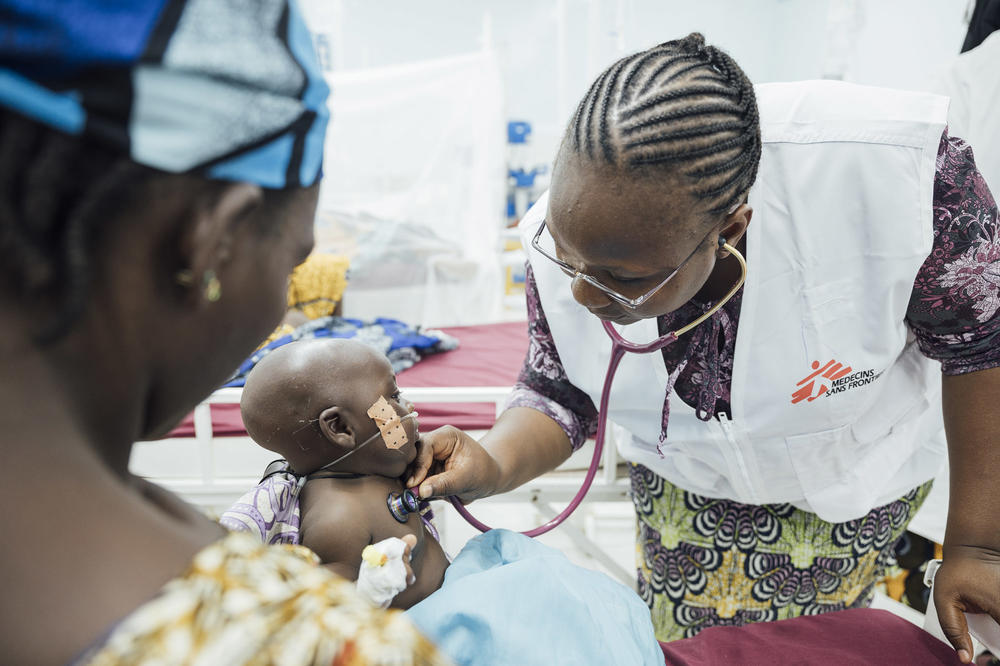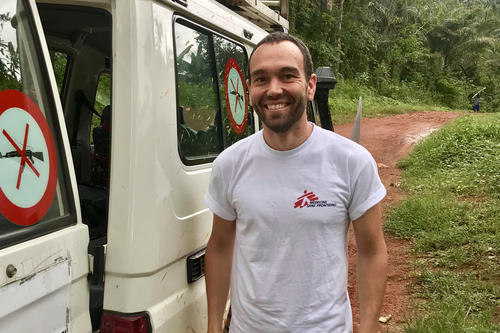“An Organization Very Close to Our Hearts”
Freie Universität Berlin has organized a fundraising campaign for Médecins Sans Frontières as part of its seventy-fifth anniversary celebrations
Jul 12, 2023
Dr. Adiaratou Dakono examines four-month-old Abdousalam Issa and advises his mother, Saadatou Saminoa (Madarounfa, Niger).
Image Credit: Oliver Barth/MSF
As part of its seventy-fifth anniversary celebrations, Freie Universität Berlin has organized a special fundraising campaign: “Seventy-Five Years of Free Thinking: Celebrate and Donate” in support of the international medical relief organization Médecins Sans Frontières. Stefan Tihi provides insight into the work that the organization carries out and how the donations it receives are used to help people in crisis settings around the world. The thirty-nine-year-old worked for Médecins Sans Frontières for three years. In his role as financial coordinator, he carried out field assignments in South Africa, Nigeria, Afghanistan, and most recently in Brazil during the Covid-19 pandemic. He has now returned to Germany, where he lives in Berlin.
Mr. Tihi, in a nutshell: What is the mission of Médecins Sans Frontières (MSF)?
Médecins Sans Frontières provides humanitarian, medical care wherever it is needed. It is active on the ground, providing direct aid to those in crisis settings. In addition to providing emergency medical care, MSF also provides preventative support, for example, through the construction of sanitary facilities.
Freie Universität has organized a fundraising campaign for MSF as part of its seventy-five-year anniversary celebrations. What should university members know about the organization?
Médecins Sans Frontières is an independent organization. This is a key aspect of its work, allowing it to work free from the influence of individual states or large companies. The majority of donations come from private individuals or small companies. Being self-governed means that MSF can act quickly in emergencies – and provide assistance where it is most urgently required.
What’s more, the money goes where it is truly needed – to people in crisis settings. This is something that I can confirm from my own personal experience as a financial coordinator – but you can also look it up in their annual financial reports. MSF does not pay its managers disproportionately high wages, nor does it use the donations to finance an expensive headquarters location. The fact that almost ninety percent of MSF’s income goes into its projects on the ground is a big motivator for its volunteers.
How does MSF decide which areas to help?
MSF manages five Operational Centers in Paris, Amsterdam, Brussels, Barcelona, and Geneva. These operate independently of each other and organize aid projects using their own budgets. It has been active in some regions for decades – for example in South Sudan, the Democratic Republic of the Congo, or Afghanistan. When deciding where to deploy volunteers, doctors and logistics experts first analyze the situation. They look at what is happening in the region – whether MSF is required and whether MSF can make a long-term contribution to the situation. The aim of Médecins Sans Frontières is not to simply provide a bit of help here and there before withdrawing completely. The aim is to make a lasting contribution. MSF also works to ensure that the structures it establishes for local volunteers can remain intact in the long term.
How did you first get involved with Médecins Sans Frontières?
I worked in a number of financial and inspection positions in the private sector for many years, and worked abroad for some time. There came a point where I found myself asking whether this was going to make me happy in the long term. I started looking around for alternatives and even thought about retraining or going back to school. As a “numbers guy,” it is not that common to find much overlap between my sector and the humanitarian field, but that happened to be exactly what Médecins Sans Frontières was looking for – a financial coordinator.
While MSF does prepare its staff very well for field assignments, the work we carry out on the ground is very difficult – regardless of whether you are a doctor, a chef, or a financial coordinator. I remember one of my first projects in Nigeria, working in a region where Boko Haram was (and continues to be) active. We heard bombing throughout the entire night – you simply can’t prepare yourself for something like that. Every morning on our way into the office or when visiting the hospital, which was still provisional at the time, we would also be confronted with devastating scenes of poverty.
Are you still involved with Médecins Sans Frontières?
My wife and I – we met while working for MSF in Afghanistan – now live in Berlin, where I have a job in commerce. However, we are still involved with Médecins Sans Frontières, both privately and as volunteers – it is an organization very close to our hearts. It is important to note that you don’t necessarily need medical training to be able to support the work that MSF does – simply donating what you can is a great start.
This article originally appeared in German in the Tagesspiegel newspaper supplement published by Freie Universität Berlin.
Further Information
Seventy-Five Years of Free Thinking: Celebrate and Donate
Freie Universität Berlin is dedicated to upholding the principles of democracy, freedom, and autonomy. Due to its unique history and the reasons why it was founded, Freie Universität Berlin is very conscious of its responsibility to society and has a long track record of supporting humanitarian causes around the globe. Many members of our university also spend their free time volunteering for different charities and non-profit organizations at home and abroad. In this spirit, we not only want to take 2023 as an opportunity to celebrate our seventy-fifth anniversary, but also as an occasion to shine a light on the crises currently happening around the world and to continue our tradition of social engagement by sending aid to those in need.
Find out more information about our donation campaign
Médecins Sans Frontières provides medical assistance to millions of people affected by conflict, epidemics, disasters, or exclusion from healthcare, regardless of race, religion, or political convictions. It is a humanitarian organization with approximately 65,000 specialists from fields such as medicine, psychology, and logistics currently active in more than seventy countries around the world. Médecins Sans Frontières was awarded the Nobel Peace Prize in 1999.


